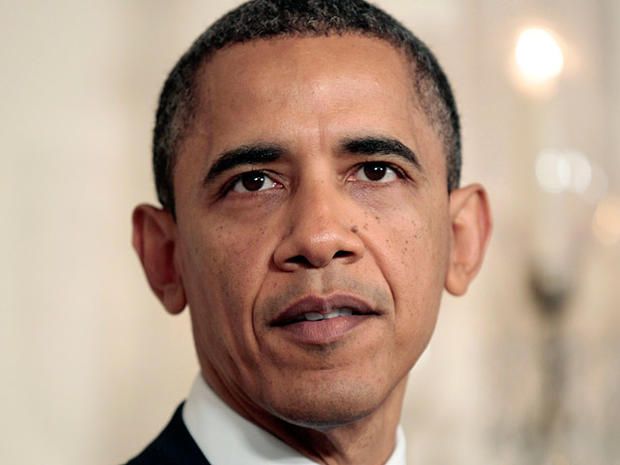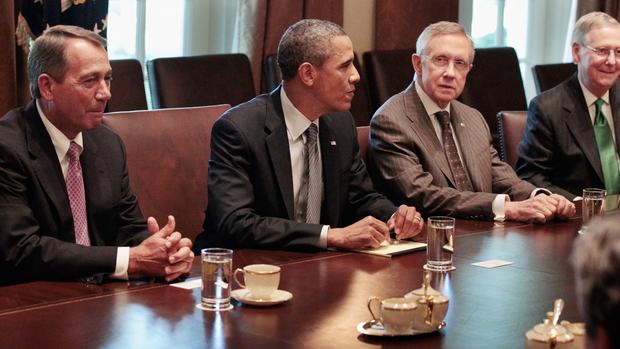Debt deal could boost Obama in 2012
For crafting a complex last minute resolution to a crisis solely of its own making, no one in Washington should really feel good about the debt deal. While some on the right and many on the left are not happy with the deal, even President Obama and the congressional leaders he negotiated with have said it's not the perfect bill. But there's a possible silver lining in this debacle for the White House and Democrats.
Here's why: while it may look to many in his party as a raw deal, Mr. Obama succeeded in showing leadership in the end by brokering any deal to solve the crisis, showed he was willing to compromise and take less than he wanted, and showed he was serious about tackling the looming debt crisis facing the country.
With a trillion dollars in cuts to federal spending, and more on the way, all sides succeeded in showing they weren't initially just kicking the can down the road, or whistling past the graveyard, though everyone also acknowledges that there still has to be some serious conversations about government spending and priorities in the years to come - and the establishment of a congressional super committee could begin to do just that.
In one fell swoop, Republicans may have handed Mr. Obama one of their top political issues to use against him on a silver platter, because not only does the president get to show his budget hawk-ness, in the process, the House Republicans have managed to drag their low approval ratings even lower with their actions through this standoff.
White House sells debt deal ahead of congressional vote
Americans unimpressed, but glad to see debt deal
Twitter explodes (mostly angrily) over debt deal
Even the Wall Street Journal said in an editorial this weekend, "Republicans are not looking like adults to whom voters can entrust the government."
The Tea Party caucus, who came to Washington change it, to cut spending and make government leaner (re-election or not), succeeded in truly changing the nation's capital. House Speaker John Boehner is right to point out that months ago a deal of only spending cuts would have been impossible and is right to give credit to the new Republican majority for pushing the spending cut issue and holding their ground.
But their short term goal of cutting spending may come back to haunt them. While they rose to power at a time of profligate spending, since taking over, they've since allowed the president to cut a deal to extend the Bush tax cuts, cut a deal to cut trillions in federal spending, and, with this package, are laying out a framework for comprehensive tax reform. The White House has clearly looked at the November 2010 elections and chosen to change course, while aiming to protect the Democrat's values, including Medicare and Social Security.
Call it "triangulation" or call it governing, but much to liberals' dismay, after two years on the left, the Obama White House has tacked to the center in the country politically and could be set up for continued success.
Why? Because for independent voters, the true golden ticket in any election, Mr. Obama is seen as a pragmatic voice, working for the benefit of all. Yes, unemployment and the economy will likely decide his re-election fate, but for in this crisis, he played the middle and could in the end, be seen to have come out ahead in an otherwise winner-less battle.
He had public opinion on his side in the debt debate, with a majority of Americans wanting a balanced package that included new taxes. Neither Mr. Obama nor the American people got that, but he showed he was willing to compromise, also something voters want to see from their elected leaders.
Debt deal inspires global stock markets
Boehner trumpets GOP influence in debt debate
Special section: America's debt battle
But the true victory here may be the fact that this issue is now off the front pages and possibly out of the Republican playbook. Weeks ago, Republican Senate Leader Mitch McConnell was vilified by the tea party for his plan to allow Mr. Obama to raise the debt ceiling on his own with congress being able to vote against it almost ceremoniously. That would have kept the "Obama as big spender" issue alive up through the 2012 election.
While part of his convoluted package includes those votes of disapproval in the second step raise of the debt limit, Mr. Obama can go into re-election having dispensed of that label because the deal includes real cuts. And if he can accomplish tax reform to lower tax rates for both individuals and corporations, then he would take another arrow out of the traditional Republican political quiver.
From CBS Moneywatch.com:
Carla Fried: Debt deal winners and losers
Alain Sherter: why the debt ceiling pact is bad economics
Conrad de Aenlle: Debt deal won't fix entitlement spending problem


